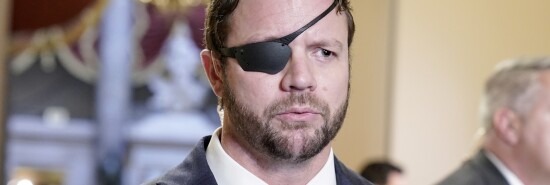
Crenshaw bill against college DEI oaths is well aimed
Washington Examiner
Video Embed
Rep. Dan Crenshaw (R-TX) has a good idea to roll back the most abusive aspects of “diversity, equity, and inclusion” regimes on college campuses.
He is introducing a bill to bar post-secondary institutions from receiving federal funding if they compel students or employees to write or swear allegiance to DEI statements. His goal is laudable, and his proposal appears narrowly tailored enough to avoid drawbacks that might otherwise inhere in the use of federal funding as a cudgel for ideological ends.
CRENSHAW HAS HEATED EXCHANGE WITH WITNESSES ABOUT YOUTH GENDER TRANSITIONS
Granted, the Left has made a nefarious habit of entrapping all sorts of institutions, educational or otherwise, by hooking them on federal money until it becomes their lifeblood, then threatening to withhold it unless they comply with unwarranted intrusions. A few colleges, such as Hillsdale in Michigan, avoid this ideological extortion blackmail by refusing any federal funds.
Alas, for most institutions of higher education, such forbearance has become impossible. So heavily is federal funding tied up with student aid, research grants, and other inducements that institutions could collapse without government cash. Those who believe in limited government must prevent the feds from becoming a sort of drug pusher, hooking schools and then keeping them like supplicant junkies.
Crenshaw’s bill avoids this overreach. What government does have a right to demand is that public universities adhere to, and that private universities respect the spirit of, basic constitutional principles. If taxpayers pay the tabs, their representatives have an obligation to ensure that the money isn’t used to contradict the bedrock postulates of republican government.
On three different levels, Crenshaw’s bill is well aimed. First, on considerations of both practicality and normative ethics, it targets the Left’s DEI establishments that are noxious. They are divisive, insisting that substance and merit take a back seat to the group “identity” of the scholars or students. Separating people into classes of either “oppressors” or “oppressed,” they make a fetish of supposed victimhood while excusing low standards. DEI regimes retard the development of civic virtue.
Still, government should tread lightly in trying to impose civic virtue. The Left could just as easily use federal funding for all sorts of outrages. What sets Crenshaw’s bill apart is that it aims to prohibit practices offensive to the Constitution itself. Washington has every right to tie its money to the pursuit of constitutional ends.
Crenshaw’s bill meets this test. It allows free rein to academic research, private advocacy, and voluntary adherence to DEI principles. What it uses federal funding to prohibit, though, are two things that are blatantly anti-constitutional in design and practice.
One abomination is disparate treatment based on ethnicity or creed. The other is compelled speech. The former contravenes the Constitution’s 14th Amendment. The latter transgresses the First Amendment.
The Supreme Court has made clear that the proponents of the 14th Amendment’s equal protection clause “described its ‘foundation[al] principle’ as ‘not permit[ing] any distinctions of law based on race or color.’” Crenshaw’s bill supports this constitutional principle by saying colleges may not require a statement from its students and workers “that promotes the differential treatment of an individual … based on race, color, or ethnicity.”
Likewise, just as the First Amendment ensures that government may not restrict speech of a nonthreatening nature, so too does it forbid rules that compel particular speech content. As the late Justice Robert Jackson wrote, and as has been affirmed repeatedly: “If there is any fixed star in our constitutional constellation, it is that no official, high or petty, can prescribe what shall be orthodox in politics, nationalism, religion, or other matters of opinion or force citizens to confess by word or act their faith therein.”
Crenshaw’s bill forces colleges to honor that principle. It is an extra mark in its favor that the compelled speech it prohibits is so contrary to American tradition — and to basic human decency.
